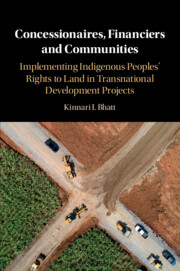 Concessionaires, Financiers and Communities
Concessionaires, Financiers and Communities Book contents
- Concessionaires, Financiers and Communities
- Concessionaires, Financiers and Communities
- Copyright page
- Dedication
- Contents
- Preface
- Acknowledgements
- 1 Development Projects, Indigenous Peoples’ Land Rights and Rights Implementation
- 2 Characteristics of Indigenous Peoples and Development Projects
- 3 In the Shadows of the Operational Development Project
- 4 Bridging the Gap through the Elephant in the Room?
- 5 Discretion, Delegation, Fragmentation and Opacity
- 6 Pricing for Poverty
- 7 Negotiating Land Outcomes
- 8 Moving Forward
- Index
2 - Characteristics of Indigenous Peoples and Development Projects
Published online by Cambridge University Press: 02 March 2020
- Concessionaires, Financiers and Communities
- Concessionaires, Financiers and Communities
- Copyright page
- Dedication
- Contents
- Preface
- Acknowledgements
- 1 Development Projects, Indigenous Peoples’ Land Rights and Rights Implementation
- 2 Characteristics of Indigenous Peoples and Development Projects
- 3 In the Shadows of the Operational Development Project
- 4 Bridging the Gap through the Elephant in the Room?
- 5 Discretion, Delegation, Fragmentation and Opacity
- 6 Pricing for Poverty
- 7 Negotiating Land Outcomes
- 8 Moving Forward
- Index
Summary
This chapter gives more clarity on indigenous peoples as communities that, given their special social and cultural connection with land and natural resources, are inherently vulnerable to the global spread of projects that necessitate significant, and often irreparable, land disturbance and the transnational legal dynamics and behaviours that facilitate that disturbance. Far greater effort is needed to think about the indigenous movement in a more pluralistic framework: as specifically vulnerable to development projects in a much broader outlook, that is, beyond settler-colonial geographical area and one in which private concessionaires and financiers are, through contractual and policy mechanisms, shaping the movement with significant impacts for rights recognition and implementation. This chapter also defines the specific characteristics of modern development projects that matter for indigenous land rights issues, including the diminished role of the state in these projects and the implementation gaps that appear in development finance mechanisms for resettlement. The chapter concludes by examining the private legal nature of the plural contracts that secure a development project.
Keywords
Information
- Type
- Chapter
- Information
- Concessionaires, Financiers and CommunitiesImplementing Indigenous Peoples' Rights to Land in Transnational Development Projects, pp. 23 - 51Publisher: Cambridge University PressPrint publication year: 2020